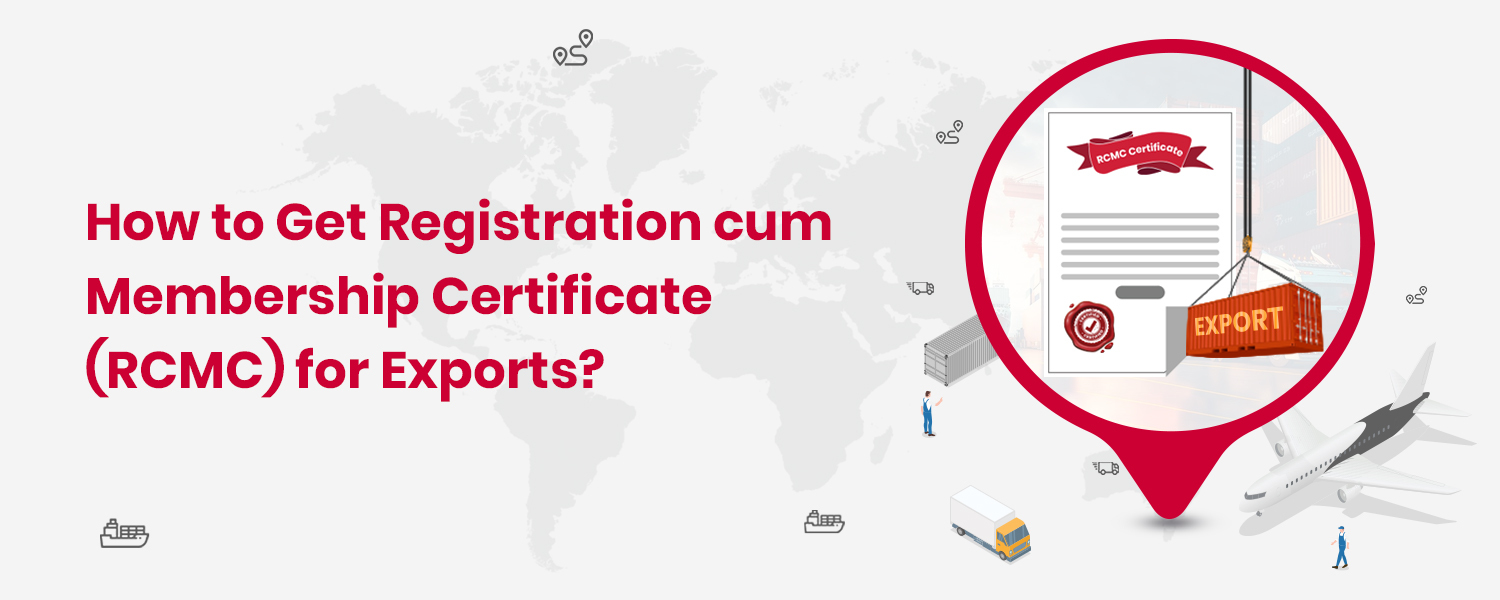Ever feel like getting your new export business off the ground is an endless maze of paperwork? Between licenses, registrations, and a mountain of acronyms, it’s easy to feel overwhelmed before you even ship your first order. However, the Registration Cum Membership Certificate (RCMC) can be a valuable tool for your export business.
While it’s not mandatory for everyone, RCMC is a must-have if you’re dealing with certain products. More importantly, it unlocks profound benefits, government schemes that can save money, insider knowledge for a competitive edge, and much more. Let’s break down the RCMC mystery together, from how to get it to why it’s worth the effort.
What is a Registration Cum Membership Certificate (RCMC)?
Let’s ditch the official-sounding definitions for a minute. Think of RCMC as your export business’s exclusive club membership card. It unlocks the world of possibilities otherwise off-limits. This certificate is issued by Export Promotion Councils (EPCs) or Commodity Boards. These are government-backed organisations specialising in promoting a specific category of products, such as engineering goods, pharmaceuticals, spices, you name it.
RCMC is your proof of legitimacy. It flashes a green light to customs officials and potential overseas partners, showing them you’re a genuine exporter who follows Indian regulations. Trust is essential in international trade, and this certificate helps build it.
But here’s the best part: RCMC gives access to government schemes that can reduce export costs, opportunities to network at trade shows, and even inside leads on potential buyers.
Why Do Businesses Need RCMC for Export?
1: It’s Required for Certain Products
We’re not just talking about red tape here. But, when exporting certain products, like spices, agricultural goods, tea, leather, and others, you need a valid RCMC to avoid getting involved. You could face delays at customs, fines, or even have your shipment blocked altogether. People want their goods to gather dust at the port. The RCMC is your insurance policy against those headaches.
2: Access to Government Support Schemes
The government has schemes like MAI (Market Access Initiative) and EPCG (Export Promotion Capital Goods) specifically designed to help exporters like you thrive. But to access them, you usually need that RCMC card in hand.
Say you’re gearing up to exhibit your products at a big food trade show in Dubai to find buyers to export from India. Schemes like MAI could reimburse a chunk of your expenses – airfare, booth costs, you name it! That extra cash can make a huge difference for a smaller business. The RCMC is your ticket to these programs, giving you a fighting chance in the competitive global market.
3: Financial Perks Beyond Schemes
The RCMC’s benefits continue beyond those fancy-sounding government programs. It can even impact your everyday cash flow. Let’s talk about GST, everyone’s favourite topic, right? (Okay, maybe not, but bear with me!)
Say you need to purchase some raw materials for your export products. With a valid RCMC, you may be eligible for a Letter of Undertaking (LUT). This lets you buy those materials without paying GST upfront. That’s potentially a big chunk of money saved, especially if you make regular purchases.
Here’s another scenario: if you’re a merchant exporter, meaning you buy and resell goods for export, the RCMC can be your saving grace. It lets you source products at a much lower GST rate, making you more competitive on prices with overseas buyers.
4: Knowledge is Power
Remember those Export Promotion Councils we talked about? Think of them as something other than the folks issuing your membership card. They’re information powerhouses, particularly for newer exporters still learning the ropes.
EPCs keep track of changing market trends. There may be a sudden surge in demand for your product type in a specific country. Your EPC can alert you, giving you an edge over less informed competitors. Plus, with the tangle of export regulations, it’s reassuring to know you’ve got a place to go for updates and clarifications as policies shift.
Think of your EPC as an experienced guide helping you navigate the often confusing landscape of international trade. Especially if you’re starting your export journey, that kind of support is worth its weight in gold.
5: Networking and Lead Generation
In the world of exports, it’s often not just about what you sell but who you know. Think of your RCMC as your ticket to a broader network. EPCs frequently organise trade shows and buyer-seller meets here in India and abroad.
These events are where connections happen. Imagine showcasing your products directly to potential buyers or getting on-the-spot feedback about what international markets are looking for. That access is invaluable, especially if you’re a minor exporter trying to make a name for yourself.
6: The Reputational Boost
Let’s be real: when an overseas buyer is choosing suppliers, they want to minimise risk. Seeing that you hold a valid RCMC sends a signal: you’re serious about exports, and you play by the rules. That kind of legitimacy matters.
Think about it from the buyer’s perspective. Would you feel more comfortable dealing with a company that’s part of a recognised EPC or an unknown entity? The RCMC can be the factor that makes you stand out in a crowded marketplace, especially when building those initial relationships.
How to Get a Registration Cum Membership Certificate (RCMC)?
1: Visiting the DGFT Website
The first thing you’ll need is the address of the Directorate General of Foreign Trade (DGFT) website. Here’s the link: https://dgft.gov.in/CP/. Once you’re on the homepage, look for the “Services” tab at the top. Under that, you’ll find the option for “E-RCMC.” Click on that, and you’re ready to begin.
2: Logging In
To access the RCMC application, you’ll need your DGFT login credentials. If you already have an Import Export Code (IEC), you automatically have a DGFT ID and password. Enter those to proceed. However, if you need clarification on your login details, there’s usually an option to retrieve them on the website. Another alternative is using your Digital Signature Certificate (DSC) or Aadhaar e-Sign for secure login. Choose whichever option is most convenient for you.
3: Filling Out the Main Form
This is where things get interesting. The main application form will be split into a few sections. Here’s what to expect:
- Essential Details: Your business name, address, contact info – all the straightforward stuff. If you have an IEC, some of this info might automatically fill in, saving you time.
- RCMC Details: This is the central part of the application, so pay close attention. You’ll need to choose your relevant Export Promotion Council (EPC), list your main categories of export products, and how long you want your RCMC to be valid.
4: Uploading Documents
Get those files ready because it’s upload time! Here are the most common documents you’ll need:
- Business Registration: Provide a copy of your business registration, such as your GST certificate, Udyam certificate, or similar documentation.
- PAN Card: Submit your company PAN or personal PAN if you are a sole proprietor.
- Export Turnover Figures: A Chartered Accountant (CA) certificate verifying your export sales for the previous few years is required.
- Additional Licenses: Certain products, such as pharmaceuticals or specific chemicals, may necessitate additional licenses or permissions. Attach these documents if applicable.
5: Declaration and Submission
Before final submission, you will be asked to review a declaration attesting to the accuracy of all provided information. Ensure all details in your application are correct and up to date to avoid delays in processing.
To electronically sign and submit your application, you have two options:
Digital Signature Certificate (DSC): If you have a DSC associated with your business, utilise it for secure electronic signature and submission of the application form.
Aadhaar e-Sign: For a convenient alternative, you may use your Aadhaar-linked verification method for submission.
Upon successful submission, you will receive a confirmation message via email or within the DGFT portal. You may track the progress of your RCMC application through a designated section on the portal. Processing times can vary, and the website should provide an estimated timeline.
Conclusion
We’ve covered a lot about RCMC, which might still feel overwhelming. But remember, getting RCMC is often a worthwhile investment that opens up exciting possibilities for your export business. While the RCMC is an important step, it’s just one piece of the puzzle. By taking things one step at a time and utilising the resources available, like NimbusPost, you’ll be well on your way to growing your global customer base.
NimbusPost is an international logistics platform for those starting an import and export business. It offers a pool of features that streamline exports from India. These include a courier recommendation engine, hassle-free custom clearance, faster deliveries, and much more.
FAQs
Is RCMC mandatory for export?
Yes, a Registration Cum Membership Certificate (RCMC) is mandatory for exporting goods from India. This certificate, issued by the Export Promotion Councils or Commodity Boards, proves that you are a registered exporter.
What are RCMC fees?
RCMC fees are the costs associated with obtaining and maintaining a Registration Cum Membership Certificate (RCMC) in India. This certificate is mandatory for exporters. Here’s a breakdown of the fees:
New RCMC Fee: (Rs 3,068, including 18% GST) This is a one-time fee paid when initially applying for an RCMC.
RCMC Renewal Fee: (Rs 2,301 per year, including 18% GST) This is an annual fee to keep the RCMC valid and active.
Amendment Fee: (Rs 1,000, plus GST, each time of amendment) A fee is charged when changes are made to the RCMC, such as updating company information or adding product categories.
What is the validity of an RCMC certificate?
An RCMC (Registration Cum Membership Certificate) has a validity period of five years from its issuance date. It begins on the 1st of April of the licensing year issued and expires on the 31st of March of the fifth licensing year.
How many days will it take to get an RCMC certificate?
The processing time for obtaining an RCMC certificate can vary slightly depending on the specific Export Promotion Council or Commodity Board you apply through. However, on average, you should receive your RCMC certificate within 7-10 working days after submitting your application and required documents.




